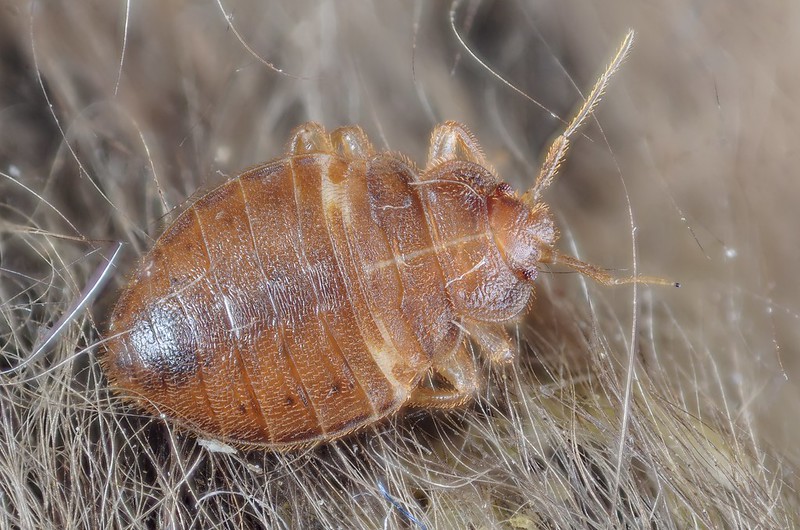How do you get Bed Bugs?
If you trace it back, most bed bug infestations happen through accidental introduction into an environment. Simply put, they have to be brought into an environment in order to infest.

If you trace it back, most bed bug infestations happen through accidental introduction into an environment. Simply put, they have to be brought into an environment in order to infest.

Nearly everyone who discovers they have bed bugs has the same first question:
“How did I get bed bugs?”
The short answer is that you probably brought them home.
Do you have any new furniture or clothing that you purchased secondhand at a resale shop? Have you just returned from a long summer abroad?
As they say, “An ounce of prevention is worth a pound of cure.” Understanding how these little critters get into your bed can go a long way towards making sure that you stay bed-bug free in the future.
First, let’s address the elephant in the room: you don’t get bed bugs because you’re dirty. There’s a stigma attached to having bed bugs, but the fact is that it’s probably not your fault.
Bed bugs don’t migrate indoors from the outside. You can’t attract them by being unclean, or by having a dirty home.
For the most part, you have to have brought them with you. Yes, it’s gross, but it’s probably true.
Bed bugs are crawlers; they don’t fly or jump.
Bed bugs are also very good clingers — they’ll cling on to clothing, furniture, and all kinds of soft textiles. Many vintage clothing and antique (mid-century modern, anyone?) collectors have ended up unknowingly introducing bed bugs into their homes with their latest acquisitions.
Common culprits:
It’s not just the item; it’s where you put it, too. A purse, for example, is a target because it’s often laid on the floor, left on a couch, or set on the bed (all very good spots to find bugs).
If you haven’t brought anything new into the home, you likely brought them in from another location that you visited recently. Travel is one of the most common ways to pick up bed bugs, but it doesn’t have to be a big trip: even the subway can be infested with bugs.
New York City subways have had to be fumigated for bed bugs multiple times over the years. Any number of riders could have picked them up and brought them home on their clothing or bags.
Even though they can’t jump or fly, bed bugs can migrate easily from apartment to apartment or dorm to dorm. Multi-tenant buildings are common locations for infestations.
Once they’re in your things, bed bugs can live for a tremendous amount of time. The good news is that there are a few steps you can take to help mitigate your chances of taking home an unwanted hitchhiker.
Bed bugs are attracted to warm-blooded animals. Anywhere that you’ll sit, sleep, or lean on could facilitate a transmission.
Due to significantly higher amounts of nightly turnover, hotels, hostels, and homeless shelters can be high-risk locations. Again, it has very little to do with how clean these places are; it’s just a function of how many people they serve. More people means a higher likelihood that one of them brought bed bugs in with them.
When traveling, you should avoid placing your luggage (and clothes) anywhere that bed bugs might be tempted to crawl. Experts suggest that you should stick to using luggage racks, found in most rooms.
The tell-tale signs of a bed bug infestation are:
Furniture and other items should be thoroughly inspected. Pay close attention to fabric seams, flaps, buttons, and any other indentations that might provide some shelter or darkness for hiding bugs. Carefully check all joints and places where wood or structural components meet and come together.
The most common place to find bed bugs in a hotel or hostel is around the headboard, especially if it’s wall-mounted.
Keep an eye out for any peeling paint or wallpaper that the bugs can tuck under. Also, look for signs around light switch plates or power outlets.
Heat is very effective at killing bed bugs. Once you arrive home from a hotel or somewhere that you suspect may have had bed bug potential, you should run your clothes through a hot wash, ending with a hot dryer cycle.
If the item isn’t machine washable, you should consider placing it into a vacuum-sealed bag. Be warned: it might be in there a while, as bed bugs can survive up to a year without a meal.

If you’ve been up scratching at night, you might have one question: Can permethrin kill bed bugs? The answer is yes, it certainly can.

Can bed bugs make you sick? They can, in some cases. If you’re dealing with bed bugs, you could also be at risk for allergies, itching, insomnia, infections, and more.

With so many uses, peppermint oil is a powerhouse when it comes to reducing various physical maladies and cleaning. But does peppermint oil kill bed bugs?

Vinegar has a lot of uses in the home, and it’s often touted as a way to repel or even kill insects. But does vinegar kill bed bugs? Let’s find out.

Does Raid kill bed bugs? After all, it makes quick work of ants, cockroaches, and other household pests. It’s a common question and one that has a multifaceted response.